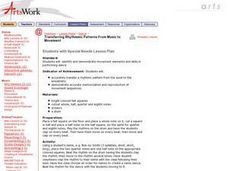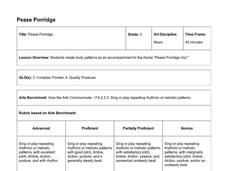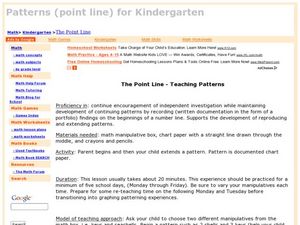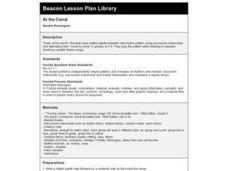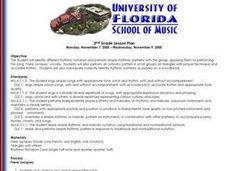Curated OER
RHYTHMIC PATTERNS
Students explore rhythmic patterns. They create and perform the rhythms and use Cubase software to perform, record, and play rhythms for use in dictation exercises. They identify and count rhythm patterns
Curated OER
Rhythmic Pattern and Movement
Students practice repeating rhythmic patterns in unison. Next, students work in groups to practice an alternate rhythmic pattern to Row, Row, Row Your Boat. They create their own rhythmic patterns for the song.
Curated OER
Transferring Rhythmic Patterns From Music to Movement
Students identify and demonstrate movement elements in relation to musical notation. They clap to rhythms, beat on drums, match musical notes to speech patterns and use the rhythms of the their names to create a dance.
Curated OER
Learning Different Rhythmic Patterns
Fifth graders observe and demonstrate different rhythmic patterns including combinations of quarter and rest notes. They discuss how rhythm is created by using quarter and rest notes, clap to a rhythmic pattern, write a rhythm, and...
Curated OER
Rock Till You Drop!
Students study rhythmic patterns and phrases on percussion instruments. They form a drum circle and take turns playing the beat. After listening to styles of rhythms, students compare styles of music. They compose a short piece of...
Hawaiʻi State Department of Education
Ostinato
Quarter notes, eighth notes, and rests; it's time to read rhythmic patterns in music. The class plays ostinatos as they practice identifying rhythmic patterns. They then listen to Mannheim Steamroller as they draw geometric patterns that...
Hawaiʻi State Department of Education
Pease Porridge
Practice using different ways to express a single pattern. The class uses concrete, pictorial, and numerical modes to represent patterns found in a simple rhyme. They will move their bodies, use body percussion, draw, and use numbers to...
Hawaiʻi State Department of Education
Beethoven’s 5th
Time to pick up an instrument and practice the first part of Beethoven's symphony No.5. Young musicians discuss melody, rhythmic pattern, dynamics, and movements found in symphonic and orchestral pieces. They then practice and play the...
Curated OER
Rhythmic Movement Skills
Students participate in series of rhythmic movements to demonstrate skill in dance elements. In this rhythmic movements lesson plan, students answer sequentially developed questions which include clapping and marching to explore...
Curated OER
The Point Line - Teaching Patterns
Students practice extending patterns. In this patterns lesson, students demonstrate extending patterns by performing a rhythmic patter.
Curated OER
AT THE CORRAL
Students study dotted eighth/sixteenth note rhythm pattern using percussion instruments and alternating from "corral to corral" in groups of 4-6. They play the pattern while listening to selected American western theme songs.
Curated OER
Rhythm In Motion
Sixth graders work independently and with a partner to demonstrate proficiency of steady beat, meter and basic note values while creating written rhythmic patterns for class performance. State and National Standards are addressed.
Curated OER
Overture to 'William Tell' by Gioacchino Rossini
Students create an awareness of how music creates a setting in a story or legend. They identify the instrumentation, dynamics and tempo used to create various settings for a musical story. They perform rhythmic patterns from listening...
Curated OER
Frere Jacgues
Second graders identify different rhythmic notation and perform simple rhythmic patterns with the group, applying them to performing the song "Frere Jacques" vocally. Emphasis is placed on meeting State and National Standards for the Arts.
Curated OER
Totally Ternary
First graders compose a simple nursery rhyme with percussion and instrumental accompaniment in the general music classroom setting. AB form and rhythmic patterns are emphasized in this 35-40 minute lesson plan.
Curated OER
Tumbling and Movement
Students perform basic tumbling activities. In this movement lesson, students practice tumbling and balancing moves while listening to music. Students are "frozen" into place while in certain positions.
Curated OER
Shoes And Singin
Students analyze rhythmic patterns (beat versus no beat), sing an echo song on Solfege syllables, improvise melodies, and express music through creative movement. This lesson is written to meet State and National Standards for the Arts.
Curated OER
Salad Sisters
Students practice and perform 8 and 16 beat rhythmic patterns in 4/4 using the song "Salad Sisters" as a basis in this elementary-level General Music lesson. An amazing lesson for teaching cooperative music composition techniques and...
Hawaiʻi State Department of Education
Fuzzy Wuzzy
You don't need drums to play percussion; you can use your own body. Second graders use body percussion to make four-beat rhythms and play patterned clapping games. When they are finished they discuss beats, patterns, rhythm, and rhyme.
Curated OER
Classroom Idea: Clap Along
Students study patterns. In this math lesson, students repeat a pattern that has been clapped out by the teacher. Actions can be added to increase difficulty level.
Curated OER
Rhythm Compositions
Fourth graders collaborate in small groups to create simple rhythmic patterns in different time signatures. Each group creates rhythms in a competitive "game" atmosphere and then constructs entire rhythmic groups for presentation to...
Curated OER
First Rhythmic Composition
Students apply fractions to counting rhythm in music. In this algebra instructional activity, students interrelate the concept of math into music as they fill out a chart identifying the names and symbols of music notes and their...
American English
Welcome to the Color Vowel Chart
Focus English language learners' attention on word stress and phrase stress with a pronunciation chart that breaks the sounds into moving and non-moving vowel sounds. The chart tool uses colors and key words to indicate...
Curated OER
Illustration # 1: Source of Illustration
Students play a game of imitating steady beats by mimicking the instructor. They use drums and repeat the game by echoing rhythmic patterns. The patterns may vary in degree of difficulty according to each individual's ability.




